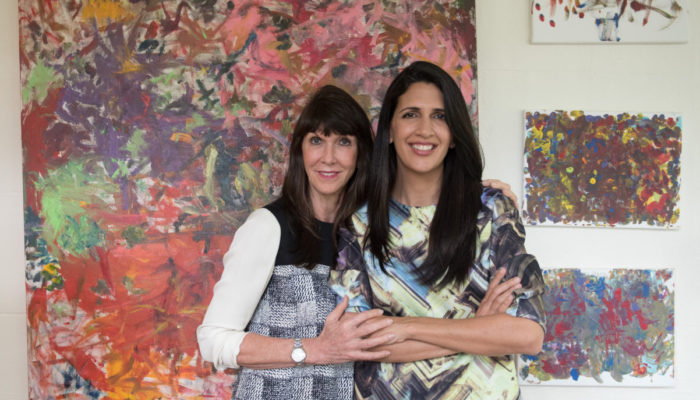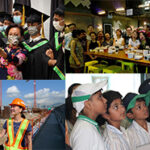Alia Eyres (South Island School 1994′)
Here’s the thing about running a non-profit: it’s a lot of work. Alia Eyres is as busy running Mother’s Choice as she ever was as a corporate lawyer. “People think you’re going to work at an NGO and there’s better work/life balance, but it’s a lot of hard work,” says the South Island School alumnus.
Luckily, Alia is familiar with hard work — and with Mother’s Choice. Her parents and two of their friends founded the organisation in 1987 when they found out that hundreds of teenage girls were facing crisis pregnancies each month. The situation is still dire today: Hong Kong has thousands of young girls who become unexpectedly pregnant every year, many of them burdened by poor sexuality education, broken families and unstable living situations. Mother’s Choice offers a helping hand, no matter if they chose to self-parent, terminate their pregnancy or choose adoption for their child. “Everybody deserves a second chance,” says Alia.
Alia was one of seven children born to Ranjan and Phyllis Marwah. She and all of her siblings studied at Bradbury School and South Island School. “It’s unusual growing up in a multicultural, multiracial family, but we never felt alone because there was always somebody else like us,” says Alia. The Marwah clan certainly did not pass unnoticed at school. “We were infamous,” jokes Alia. “My parents couldn’t handle parent-teacher day because there were just too many of us. They said, ‘They would invite all the teachers to our house for dinner and just do it all at once.’”
Alia thinks back to those school days with fondness. “I had switched into Bradbury in Primary 3 and I was really quiet. I didn’t have any confidence.” The next year, her teacher, Linda Walker, chose Alia to perform in a school play. “She looked at me and said, ‘You are going to be the lead in the play.’ I couldn’t even talk. But Ms Walker said to me, ‘You can do it.’ That totally changed my life. It gave me confidence that I didn’t even know I had.”
Alia took that encouragement to heart. In 1997, she moved to the United States to study international relations at George Washington University, followed by a graduate degree in law at Georgetown University. That led her to a job at one of the world’s largest law firms. Soon enough, though, she packed her bags and returned home to Hong Kong, encouraged by her husband, John, who had fallen in love with the city on his first visit in 2008.
Alia soon started volunteering at Mother’s Choice. It was not her first time helping out. When she was younger, she used to take out the trash, haul bricks and work on many other vital but unenviable tasks in the three heritage buildings that house Mother’s Choice. “It was mandatory volunteerism,” says Alia with a laugh. “The whole family was involved.” They still are: Alia says two of her brothers, both barristers, are our “number one volunteers.”
In 2012, when Mother’s Choice was looking for a new CEO, Alia realized that it could be her. “It was one of those lightbulb moments,” she says. “People said I was crazy for leaving the world of being a corporate lawyer and coming to work at a non-profit, but actually having legal background has been so helpful to me. The law is our social infrastructure; it’s how we relate to each other. I can understand how society works and how legal issues impact the girls we work with.”
The issues are certainly complex. Every year, there are an estimated 7,000 crisis pregnancies in Hong Kong. Babies are abandoned with alarming frequency, while many pregnant girls seek to terminate their pregnancies using unlicensed practitioners. Some cannot or do not want to get permission from their parents, which is a requirement for children under the age of 16; while others are intimidated by the high cost of the procedure at Hong Kong hospitals. Some do not even realise they are pregnant until they have reached their third trimester, after which abortion is illegal in Hong Kong.
“The issue of children in adversity in Hong Kong is a huge problem,” says Alia. “One in four children in our city live in poverty. We have almost 4,000 children living in full-time institutionalised care with hundreds waiting for a place. The majority of children who go into institutionalized care wait years for a permanent family, and many age out of the system at 18 with no family to call their own. International research shows that children growing up without a family are more likely to have addiction issues, not graduate and be incarcerated. And if they’re girl, they’re astronomically more likely to get pregnant as a teenager and the cycle begins again.”
Mother’s Choice aims to help by providing safe and nurturing temporary care for children. Each year, the organisation’s Child Care Home houses 120 children temporarily, until they can join a “forever family,” as Alia’s mother likes to call them. Pregnant girls are given support, advice and a safe place to stay if they are currently living in an unsafe environment. “We don’t want to see anyone left alone,” says Alia. The organization provides non-judgmental support for girls, which means it tries not to push girls towards any particular outcome. “You can’t really make a teenager do anything,” says Alia. “What they need is someone to hold their hand and walk alongside with them.”
Mother’s Choice also offers sexuality education classes to Hong Kong schools. Many schools have no dedicated sexuality education programme. “We don’t want to just intervene in a crisis, we want to prevent it,” says Alia. “The quality of sexuality education in Hong Kong is poor. Oftentimes, parents and teachers haven’t been taught themselves. But it’s important, not just in terms of understanding the biology but in terms of building decision-making and critical thinking skills, understanding what a healthy relationship should look like, as well as your understanding your own self-worth and value.”
More than just sexuality education, what girls need is a supportive family. “Family means everything,” says Alia. “One of the major factors in a teenage girl getting pregnant is her relationship with parents, or even having parents. Every child needs a family and every family needs to be supported by the community.”
Alia often thinks back to her own childhood. “The great thing about ESF is the sense of family and community,” she says. “I’m pushing 40 and I still have primary school teachers who write to me.” Last summer, she received a letter from one of her old Year 6 teachers, Grant Anderson, who taught all of her siblings as well. “I hadn’t seen him in more than 30 years. It was his last week on the job and I had gone to speak at the Year 6 graduation at Bradbury,” she says. “He had saved photos of me from Bradbury and I got them in the mail last summer. I was grateful to know that these are the people who remember me.”
Alia and her husband now have three young boys: Paxton, Sheridan and Blake. She hopes that they will enjoy an upbringing as encouraging as her own, and the same for the girls and women who served by Mother’s Choice. “It’s been totally life-changing working here,” she says. “Not just because there’s meaning and purpose, but because I feel this is my calling.”









